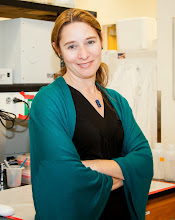We scientists love to hide behind our data…”the data shows”, “our data suggests”. When we give talks, we also love to hide behind the lectern, again letting the data speak for itself. But if you’re reading this blog, you know (at least I hope you know!) that the data doesn’t speak for itself. It’s up to us to do the talking, the inspiring, the explaining. And in order to inspire, to explain, we must connect with our audience.
One of the easiest ways to connect is to step out! Forget hiding behind the slides, and the lectern, and step out in front where your audience can see you, and you can see them. Then look around (yes, make eye contact!), smile, and talk to them. Pretend it’s a conversation, which in a sense it is, as your audience will “reply” with their eye contact, facial expressions, and body language.
I recently attended a talk by Robert Fettiplace (University of Wisconsin-Madison). Dr. Fettiplace began his talk by stepping in front of the lectern, leaning on it rather causally, and talking to us. He didn’t begin with the data, instead telling us what we were going to learn, and why it was important. Those first few crucial minutes felt like a conversation, not a lecture.
Stepping out is even more important when we speak to lay audiences. When we step out, we essentially say “we’re all together here.” We remove the barriers separating us as “the expert” from our audience, making them more receptive to our message, and to us as scientists.
Next time you give a talk, I challenge you to connect with your audience-step out!

No comments:
Post a Comment